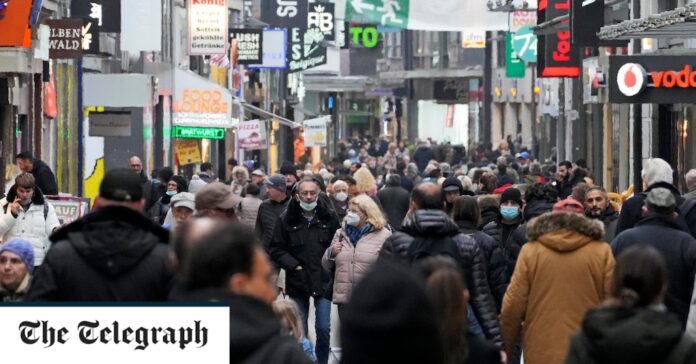European Central Bank faces more pressure to continue raising interest rates
Eurozone inflation surged past expectations to hit a new record high, piling pressure on the European Central Bank to keep raising interest rates amid warnings that prices have not yet peaked.Inflation jumped to 10.7pc in the year to October, according to Eurostat. This is higher than the 10.3pc increase expected by economists and up from 9.9pc the previous month.The increase was driven by soaring energy prices after Russia slashed gas supplies to the Continent.Separate Eurostat figures also suggested the eurozone was headed towards recession. The 19-nation bloc expanded 0.2pc in three months to September. This is down from 0.8pc in the second quarter and is likely to contract in the coming months as the cost of living continues to bite.The Bank of England expects UK inflation to peak at just below 11pc in October, suggesting almost half of the eurozone is experiencing faster price growth than Britain.This includes Germany, where inflation rose to 11.6pc in October, the highest since reunification in 1990, and Italy, where electricity prices jumped 59pc to reflect an increase in wholesale costs, pushing inflation up to 12.8pc.Inflation remains highest among the Baltic nations, which are less shielded from fluctuations in energy prices than the rest of the bloc. Inflation in Estonia stood at 22.4pc in October.The figures will reignite calls for the European Central Bank (ECB) to act aggressively to bring down inflation. The central bank has already hiked rates by two percentage points in its last three meetings, but has promised further action as soon as December.Claus Vistesen, chief eurozone economist at Pantheon Macroeconomics, said it was difficult to say if price rises had peaked. “There’s nothing really positive in these numbers. What it does say is that the ECB and other forecasters have consistently underestimated inflation.”Mr Vistesen added that “core” inflation in the eurozone, which strips out volatile increases in food and energy, was likely to remain “uncomfortably high”. The rate rose to 5pc in October, from 4.8pc in September.”This, in turn, risks a more sustained lift to inflation expectations and wage demands, which the ECB already are alarmed about,” he said.Andrew Kenningham, chief Europe economist at Capital Economics, said the eurozone’s growth outlook remained bleak. “Business surveys all point to a sharp deterioration in conditions … and we have pencilled in a substantial fall in [output] in Q4 and Q1 next year,” he said.Mr Kenningham said it was likely the policymakers would keep hiking interest rates, regardless of the growth outlook. “The increase in eurozone gross domestic product (GDP) in Q3 does not alter our view that the euro-zone is on the cusp of a recession. But with inflation having jumped to well over 10pc, the ECB will prioritise price stability and press on with rate hikes regardless.”
We rely on advertising to help fund our award-winning journalism.
We urge you to turn off your ad blocker for The Telegraph website so that you can continue to access our quality content in the future.
Thank you for your support.


